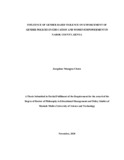Please use this identifier to cite or link to this item:
http://ir-library.mmust.ac.ke:8080/xmlui/handle/123456789/1457| Title: | INFLUENCE OF GENDER BASED VIOLENCE ON ENFORCEMENT OF GENDER POLICIES IN EDUCATION AND WOMEN EMPOWERMENT IN NAROK COUNTY, KENYA |
| Authors: | Uhuru Ndangwa, Josephine |
| Keywords: | Gender Issues Narok County |
| Issue Date: | Nov-2020 |
| Publisher: | MMUST |
| Abstract: | issues. The Government of Kenya, through the ministry of education and gender has been working hand in hand to address gender issues. In the field of education, the government has put in place measures for special programmes to promote girls’ access to education. Policies have been formulated to ensure equity, equality and empower women. These efforts have not yielded much as combination of factors continues to deny girls and women opportunity to empower themselves socially, economically and politically. This study sought to investigate the extent to which GBV influenced the enforcement of gender policies in education and women empowerment in Narok County, Kenya. Specific objectives were; to identify indicators of GBV and factors reinforcing GBV against females, to establish the extent to which GBV influences the enforcement of gender policies in education, to establish the extent to which GBV influences the enforcement of gender policies on women empowerment and to determine the level of awareness of existing laws and policies and the implication on enforcement of the laws and the policies. The study was guided by cultural lag theory by William Ogburn. The research adopted an ex postfacto survey and a descriptive survey design. Narok County was chosen on the grounds that the county was in the spotlight on GBV and that women's literacy is low. Samples were drawn using, stratified, simple random, purposive and systematic sampling. The study employed a mixedmethod approach entailing both quantitative and qualitative design. Quantitative design entailed use of questionnaire while qualitative entailed use of interviews and focus group discussions. Quantitative data was analysed through descriptive statistics and qualitative data was transcribed and discussed based on established themes. Findings revealed that GBV most of it cultural oriented such as FGM, early marriage, polygamy and gender roles and norms that contravene human rights are still rampant in Narok County. The factors that reinforced GBV against females were culture, poverty, illiteracy, lack of economic empowerment among women, and ignorance of the laws. The study showed that many girls were not able to access education, and many did not complete the intended cycle. GBV, early pregnancies, poverty and illiteracy among parents affected the enforcement of gender policies in education. The study found out that policies to empower women have not been implemented to counter poverty and traditional exclusion. Enforcement of the policies was affected by illiteracy and lack of financial independence among women, poverty and cultural impediments. The study found that the population, including some government officers, had little knowledge of the laws and policies put in place to protect and empower girls and women. This consequently affected the enforcement of the laws and policies. To end GBV the study advocates the use of a culturally sensitive approach, a strong consensual community agent, collaboration between key players, transforming the community, improving women's literacy, empowering women economically, removing women from abject poverty and giving women a voice. In education the study suggests; putting girls in boarding school, increasing funding, modifying education in ASAL and specific policies that can help girls and women who have been left out of learning. On women empowerment the study recommends the need to stimulate social change, improving women literacy, poverty alleviation, economic empowerment and protecting women from cultural impediments, abuse and exploitation. The study recommends increased monitoring and evaluation to assess the impact, extend of implementation, and extend to which the needs of girls and women are being met especially in rural areas. The study recommends sensitization programs that are not threatening including detailed information about the laws and the policies |
| Description: | PHD THESIS |
| URI: | http://r-library.mmust.ac.ke/123456789/1457 |
| Appears in Collections: | School of Education |
Files in This Item:
| File | Description | Size | Format | |
|---|---|---|---|---|
| Thesis Josephine.pdf | 7.18 MB | Adobe PDF |  View/Open |
Items in DSpace are protected by copyright, with all rights reserved, unless otherwise indicated.
